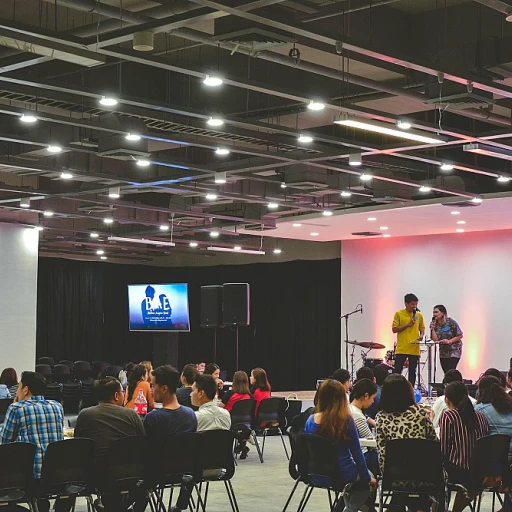Understanding the Importance of Evaluation in HR Interviews
The Role of Evaluation in Shaping the HR Interview Process
Evaluation during HR interviews is instrumental in shaping effective recruitment strategies. The process involves assessing candidates’ skills, competencies, and fit for the organization, which directly influences the quality of hiring decisions.
One of the critical aspects of this evaluation is the ability to provide feedback that benefits both interviewers and candidates. Good feedback fosters a learning environment where candidates understand areas for improvement. This feedback helps students and job seekers alike enhance their interview performance.
Assessment and feedback in HR interviews should not be confused with simple judgments. Instead, they aim to provide meaningful insights that are both constructive and educational. A quality evaluation follows best practices to ensure its effectiveness.
For learners and aspiring candidates, receiving feedback is a golden opportunity for growth. It's analogous to assessment learning in education, where formative feedback plays a crucial role in enhancing student learning. It’s essential that feedback procedures are clear, systematic, and include input from diverse perspectives. These perspectives could be from different departments or colleagues acting as ‘teachers’ in the recruitment process.
Given the importance of feedback in assessments, HR professionals strive to create a structured feedback process that aids in decision-making. Effective feedback helps in refining interview techniques and ultimately contributes to hiring high-performing candidates.
To understand more about the implications of evaluation within the HR framework, you might want to explore
this article on understanding payment obligations for unapproved overtime which hints at auxiliary decision-making considerations beyond conventional evaluations.
Key Components of High-Quality Evaluation Methods
Core Components for Effective Evaluation in HR Interviews
Effective evaluation is pivotal for assessing the potential of candidates in HR interviews. The foundation of evaluation in this context relies on clarity, consistency, and accuracy, ensuring every potential employee is judged equitably and correctly.
Comprehensive Criteria Development
To ensure high-quality evaluations, creating a well-defined set of criteria is indispensable. These criteria should align with the specific requirements and expectations of the role in question. For example:
- Leadership and team-building skills
- Communication and interpersonal abilities
- Problem-solving and decision-making capabilities
- Cultural fit and adaptability
By maintaining a detailed and relevant set of criteria, HR professionals can ensure that assessments are tailored to the job rather than to vague standards.
Utilizing Structured Interview Formats
Structured interviews involve a consistent format where all candidates are asked the same set of questions. This approach enables a more objective form of evaluation, significantly diminishing personal biases and allowing for strong performance comparison across all interviewees. By adopting such formats, the quality of assessment and feedback is enhanced significantly.
Consistent Rating Scales
Implementing standardized rating scales helps in translating qualitative responses into quantitative data. This is crucial for the assessment learning process, as it enables interviewers to determine the proficiency level of each candidate based on their responses, ultimately allowing for more informed and equitable decision-making.
Effective Training for Interviewers
Interviewers, much like teachers, require training to master the art of evaluations and providing feedback. Adequate training sessions help in ensuring that all interviewers are equipped with the skills necessary to deliver high-quality evaluations, minimize biases, and provide student feedback that is both formative and constructive.
For more detailed perspectives on how these evaluation methods come together, consider exploring
the benefits of an unlimited PTO policy, which indirectly fosters a transparent and supportive work culture, enhancing the overall interview process.
These core components lay the groundwork for creating a structured, fair, and responsive evaluation system, ultimately providing high-quality instruction that reflects the principles of education and learning tailored to HR contexts.
Feedback Mechanisms: How to Provide Constructive Feedback
Delivering Constructive and Impactful Feedback
In the realm of HR interviews, the ability to provide students with effective feedback plays a pivotal role in enhancing assessment and learning outcomes. Feedback serves as a powerful tool to help learners identify their strengths and areas for improvement, enabling them to enhance their performance in a constructive manner.
To ensure the quality of feedback, it should be timely, specific, and aligned with the objectives of the evaluation process. This allows students to gain valuable insights into their assessments and supports student learning through a formative feedback approach.
- Timeliness: Providing feedback in real time is crucial as it ensures that students can immediately act on the feedback and apply the necessary changes to their work. This contributes to a continuous learning environment.
- Specificity: Feedback should be specific and based on observable elements of the interview performance. High-quality evaluations focus on factual and objective criteria, rather than subjective opinions.
- Alignment: Effective feedback should be directly linked to the goals of the assessment learning. It should provide clear guidance and direction, helping students understand how they can achieve the desired outcomes.
Feedback mechanisms must also foster an environment that encourages learners to engage in self-assessment and reflection. Encouraging students to assess their performance can enhance their evaluation skills and deepen their understanding of the subject matter.
Importantly, providing feedback involves a thoughtful balance between highlighting areas of improvement and acknowledging achievements. This not only supports learning but also motivates students to continue developing their skills. For more insights into improving feedback techniques and ensuring effective HR interviews, explore our guide on
mastering the art of HR job interview follow-up.
Enhancing Evaluation and Feedback with Tools and Technologies
The incorporation of tools and technologies in HR interviews can drastically improve the quality of evaluation and the delivery of feedback. These advancements not only streamline processes but also contribute to a more thorough assessment of candidates and a more effective feedback loop.
Consider the following ways technology can enhance your evaluation and feedback systems:
- Automated Evaluation Platforms: These platforms facilitate real-time assessment by providing immediate analytical insights into a candidate's performance during interviews. This timely information allows HR professionals to make informed and effective decisions.
- Feedback Management Systems: To provide high-quality feedback, these systems help in organizing, tracking, and managing feedback processes efficiently. They ensure consistency and help in offering personalized feedback to each candidate, thus enhancing student learning experiences.
- Data-driven Insights: The use of analytics tools in evaluation helps in providing quality feedback based on concrete data. These insights assist in identifying patterns and areas needing improvement, hence supporting both evaluation and learning for students.
- Interactive Learning Modules: These tools can support teachers in designing assessments that engage learners effectively, encouraging a more formative feedback process essential for continuous improvement.
- Video Interviewing Software: The use of this software can provide a more comprehensive assessment of behavioral and soft skills. Furthermore, recording interviews allows for repeated evaluations, ensuring a fair and complete understanding of candidates' capabilities.
Implementing technology requires careful assessment and strategic planning but can significantly enhance the effectiveness of assessment and feedback methods. To ensure quality evaluation, integrating these technologies should be complemented with training and adaptation to changes in traditional teaching and evaluation methods, thereby boosting both student feedback and education experiences effectively.
Common Pitfalls in Evaluation and Feedback
Identifying Common Challenges in Evaluation and Feedback
Effectively evaluating and providing feedback during HR interviews can be a complex process, fraught with potential pitfalls. Understanding these common challenges is essential to ensuring high-quality evaluations and constructive feedback.
- Bias and Inconsistency: One of the most significant challenges in assessment is the presence of unconscious bias, which can lead to inconsistent evaluations. Ensuring each candidate is assessed using the same criteria can help mitigate this issue, promoting fairness and equality.
- Time-Consuming Process: Conducting thorough evaluations requires a significant investment of time. Implementing timely and efficient feedback mechanisms allows for real-time assessment, offering immediate insights and opportunities for improvement.
- Miscommunication: Providing feedback in a manner that is misunderstood or not well-received can hinder learning and performance. It is crucial to communicate feedback clearly, ensuring it is both constructive and actionable for the learners involved.
- Lack of Clear Objectives: Evaluations without clear objectives can lead to feedback that lacks focus and direction. Setting specific goals for each interview helps tailor feedback to support personal and professional growth, enhancing teaching and learning experiences.
- Inadequate Follow-Up: Feedback is most effective when followed by actionable steps and continuous monitoring. Students and teachers alike benefit from ongoing guidance to implement changes that enhance their work performance and development over time.
Addressing these common pitfalls by adopting best practices from educational and HR perspectives can significantly improve the quality and effectiveness of the evaluation and feedback process. By fostering a culture of continuous assessment and learning, HR professionals can contribute to superior performance outcomes.
Case Studies: Successful Implementation of Evaluation and Feedback Methods
Real-World Implementations of Quality Evaluation and Feedback in HR
In the dynamic arena of human resources, effective evaluation and feedback mechanisms are pivotal in ensuring the growth and development of both employees and the organization. Real-world case studies offer invaluable insights into how these processes can be successfully implemented.
One compelling example comes from the education sector, where feedback plays a crucial role in student learning and performance assessment. Here, teachers have developed a system of formative feedback to enhance teaching quality and support student growth. By providing real-time feedback, teachers can help students understand their strengths and weaknesses, ultimately improving the learning experience. This method mirrors the approach HR professionals could adopt in employee evaluations, ensuring assessments not only measure performance but also contribute to continuous development.
Similarly, companies that have integrated technology-based feedback tools into their evaluation processes report significant improvements in their feedback quality. For instance, using online platforms that allow for immediate assessment feedback can streamline the feedback process, providing employees with high quality evaluations that are constructive and timely. This real-time feedback loop supports greater engagement and quicker response times in addressing performance gaps.
Educational institutions often utilize peer assessment as a way to provide robust, multi-faceted feedback, thus fostering a culture of collective feedback learners trust. In HR contexts, a peer evaluation strategy can offer diverse perspectives, enriching the feedback students receive and assisting in more informed decision making.
The effective implementation of these methods has shown that education and HR disciplines share common goals: enhancing performance through constructive feedback and ensuring high-quality evaluations. By heeding these practices, HR professionals can create environments conducive to both personal and organizational growth, while avoiding common pitfalls that hinder feedback processes. This journey towards mastering assessment learning is fundamental for HR practitioners aspiring to provide quality feedback and improve their evaluation systems across any industry.














